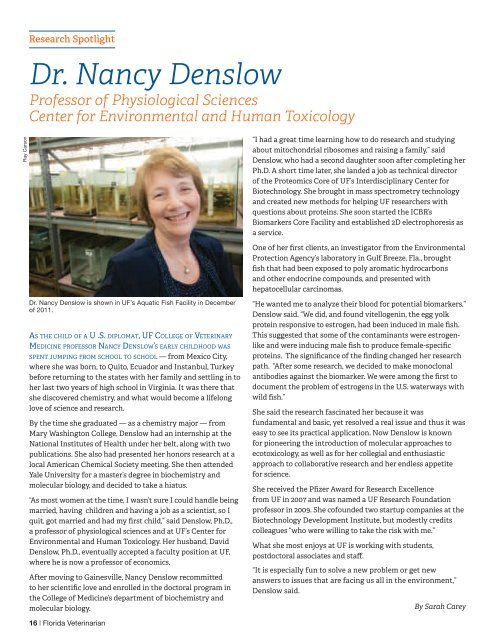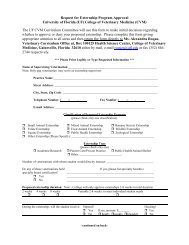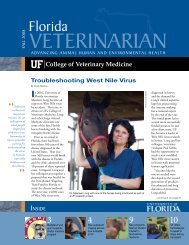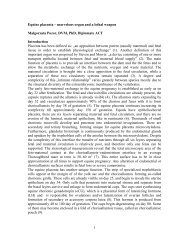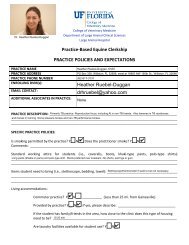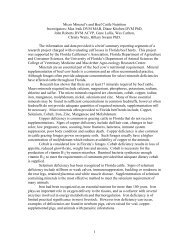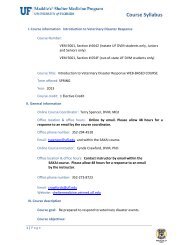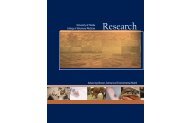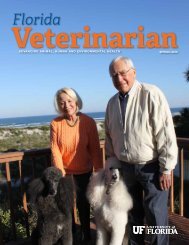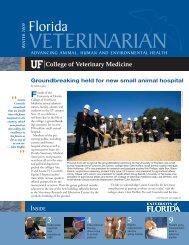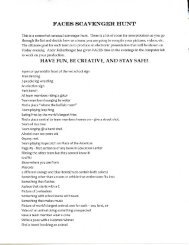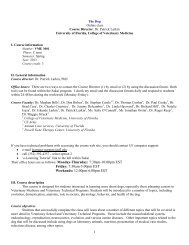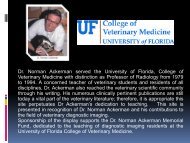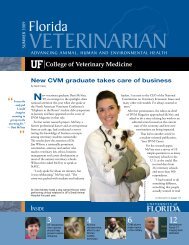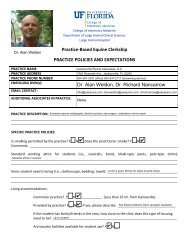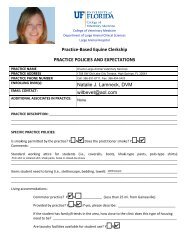Florida Veterinarian, Winter 2012 (PDF) - University of Florida ...
Florida Veterinarian, Winter 2012 (PDF) - University of Florida ...
Florida Veterinarian, Winter 2012 (PDF) - University of Florida ...
You also want an ePaper? Increase the reach of your titles
YUMPU automatically turns print PDFs into web optimized ePapers that Google loves.
Research Spotlight<br />
Dr. Nancy Denslow<br />
Pr<strong>of</strong>essor <strong>of</strong> Physiological Sciences<br />
Center for Environmental and Human Toxicology<br />
Ray Carson<br />
“I had a great time learning how to do research and studying<br />
about mitochondrial ribosomes and raising a family,” said<br />
Denslow, who had a second daughter soon after completing her<br />
Ph.D. A short time later, she landed a job as technical director<br />
<strong>of</strong> the Proteomics Core <strong>of</strong> UF’s Interdisciplinary Center for<br />
Biotechnology. She brought in mass spectrometry technology<br />
and created new methods for helping UF researchers with<br />
questions about proteins. She soon started the ICBR’s<br />
Biomarkers Core Facility and established 2D electrophoresis as<br />
a service.<br />
One <strong>of</strong> her first clients, an investigator from the Environmental<br />
Protection Agency’s laboratory in Gulf Breeze, Fla., brought<br />
fish that had been exposed to poly aromatic hydrocarbons<br />
and other endocrine compounds, and presented with<br />
hepatocellular carcinomas.<br />
Dr. Nancy Denslow is shown in UF’s Aquatic Fish Facility in December<br />
<strong>of</strong> 2011.<br />
As t h e c h i l d o f a U .S. d i p l o m a t , UF Co l l e g e o f Ve te r i n a r y<br />
Me d i c i n e p r o f e s s o r Na n c y De n s l o w ’s e a r l y c h i l d h o o d w a s<br />
s p e n t j u m p i n g f r o m s c h o o l t o s c h o o l — from Mexico City,<br />
where she was born, to Quito, Ecuador and Instanbul, Turkey<br />
before returning to the states with her family and settling in to<br />
her last two years <strong>of</strong> high school in Virginia. It was there that<br />
she discovered chemistry, and what would become a lifelong<br />
love <strong>of</strong> science and research.<br />
By the time she graduated — as a chemistry major — from<br />
Mary Washington College, Denslow had an internship at the<br />
National Institutes <strong>of</strong> Health under her belt, along with two<br />
publications. She also had presented her honors research at a<br />
local American Chemical Society meeting. She then attended<br />
Yale <strong>University</strong> for a master’s degree in biochemistry and<br />
molecular biology, and decided to take a hiatus.<br />
“As most women at the time, I wasn’t sure I could handle being<br />
married, having children and having a job as a scientist, so I<br />
quit, got married and had my first child,” said Denslow, Ph.D.,<br />
a pr<strong>of</strong>essor <strong>of</strong> physiological sciences and at UF’s Center for<br />
Environmental and Human Toxicology. Her husband, David<br />
Denslow, Ph.D., eventually accepted a faculty position at UF,<br />
where he is now a pr<strong>of</strong>essor <strong>of</strong> economics.<br />
After moving to Gainesville, Nancy Denslow recommitted<br />
to her scientific love and enrolled in the doctoral program in<br />
the College <strong>of</strong> Medicine’s department <strong>of</strong> biochemistry and<br />
molecular biology.<br />
“He wanted me to analyze their blood for potential biomarkers,”<br />
Denslow said. “We did, and found vitellogenin, the egg yolk<br />
protein responsive to estrogen, had been induced in male fish.<br />
This suggested that some <strong>of</strong> the contaminants were estrogenlike<br />
and were inducing male fish to produce female-specific<br />
proteins. The significance <strong>of</strong> the finding changed her research<br />
path. “After some research, we decided to make monoclonal<br />
antibodies against the biomarker. We were among the first to<br />
document the problem <strong>of</strong> estrogens in the U.S. waterways with<br />
wild fish.”<br />
She said the research fascinated her because it was<br />
fundamental and basic, yet resolved a real issue and thus it was<br />
easy to see its practical application. Now Denslow is known<br />
for pioneering the introduction <strong>of</strong> molecular approaches to<br />
ecotoxicology, as well as for her collegial and enthusiastic<br />
approach to collaborative research and her endless appetite<br />
for science.<br />
She received the Pfizer Award for Research Excellence<br />
from UF in 2007 and was named a UF Research Foundation<br />
pr<strong>of</strong>essor in 2009. She c<strong>of</strong>ounded two startup companies at the<br />
Biotechnology Development Institute, but modestly credits<br />
colleagues “who were willing to take the risk with me.”<br />
What she most enjoys at UF is working with students,<br />
postdoctoral associates and staff.<br />
“It is especially fun to solve a new problem or get new<br />
answers to issues that are facing us all in the environment,”<br />
Denslow said.<br />
By Sarah Carey<br />
16 | <strong>Florida</strong> <strong>Veterinarian</strong>


